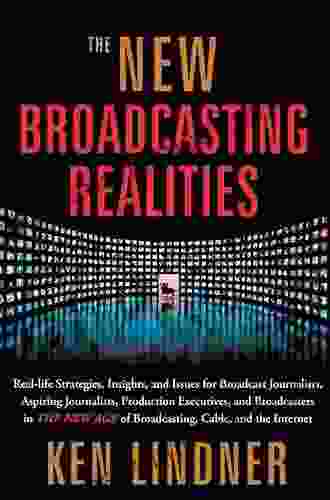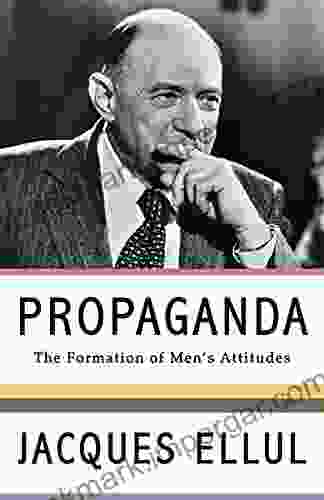Propaganda: The Formation of Men's Attitudes

Propaganda is a powerful tool that can be used to shape public opinion and influence behavior. It can be used for both good and evil, and it has been used throughout history to achieve a variety of goals. In this book, we will explore the history of propaganda, how it works, and how it can be used to influence men's attitudes.
4.7 out of 5
| Language | : | English |
| File size | : | 2088 KB |
| Text-to-Speech | : | Enabled |
| Screen Reader | : | Supported |
| Enhanced typesetting | : | Enabled |
| X-Ray | : | Enabled |
| Word Wise | : | Enabled |
| Print length | : | 352 pages |
The History of Propaganda
The term "propaganda" comes from the Latin word "propagare," which means "to spread." The first known use of the term in its modern sense was in the 17th century, when it was used to describe the efforts of the Catholic Church to spread its message throughout the world. In the 19th century, propaganda began to be used by governments and other organizations to promote their own agendas. During the World Wars, propaganda was used extensively by both sides to demonize the enemy and rally support for the war effort.
How Propaganda Works
Propaganda works by using a variety of techniques to influence people's thoughts and feelings. These techniques include:
- Emotional appeals: Propaganda often uses emotional appeals to stir up feelings of fear, anger, or sympathy. These appeals can be very effective in getting people to take action.
- Logical fallacies: Propaganda often uses logical fallacies to make its arguments seem more convincing. These fallacies can be very difficult to spot, and they can lead people to believe things that are not true.
- Repetition: Propaganda often uses repetition to drive its message home. This technique can be very effective in getting people to remember the message and believe it.
The Effects of Propaganda
Propaganda can have a powerful effect on people's attitudes and behavior. It can be used to:
- Change people's beliefs: Propaganda can be used to change people's beliefs about the world. This can be done by providing them with new information, or by using emotional appeals to challenge their existing beliefs.
- Influence people's behavior: Propaganda can be used to influence people's behavior. This can be done by providing them with instructions on how to behave, or by using emotional appeals to motivate them to take action.
- Shape public opinion: Propaganda can be used to shape public opinion on a variety of issues. This can be done by using the techniques described above to influence the beliefs and behavior of the public.
How to Resist Propaganda
Propaganda is a powerful tool, but it is not invincible. There are a number of things that you can do to resist its effects. These include:
- Be aware of the techniques of propaganda: The first step to resisting propaganda is to be aware of the techniques that it uses. This will help you to identify propaganda when you see it, and to be less susceptible to its effects.
- Think critically about the information you consume: When you are consuming information, it is important to think critically about it. This means asking yourself questions about the source of the information, the motives of the author, and the evidence that is presented to support the claims that are being made.
- Talk to others about your concerns: If you are concerned about the effects of propaganda, talk to others about your concerns. This can help you to get a different perspective on the issue, and to develop strategies for resisting its effects.
Propaganda is a powerful tool that can be used to shape public opinion and influence behavior. It is important to be aware of the techniques of propaganda and to think critically about the information that you consume. By ng so, you can help to resist the effects of propaganda and make informed decisions about the world around you.
4.7 out of 5
| Language | : | English |
| File size | : | 2088 KB |
| Text-to-Speech | : | Enabled |
| Screen Reader | : | Supported |
| Enhanced typesetting | : | Enabled |
| X-Ray | : | Enabled |
| Word Wise | : | Enabled |
| Print length | : | 352 pages |
Do you want to contribute by writing guest posts on this blog?
Please contact us and send us a resume of previous articles that you have written.
 Book
Book Novel
Novel Page
Page Chapter
Chapter Text
Text Story
Story Genre
Genre Reader
Reader Library
Library Paperback
Paperback E-book
E-book Magazine
Magazine Newspaper
Newspaper Paragraph
Paragraph Sentence
Sentence Bookmark
Bookmark Shelf
Shelf Glossary
Glossary Bibliography
Bibliography Foreword
Foreword Preface
Preface Synopsis
Synopsis Annotation
Annotation Footnote
Footnote Manuscript
Manuscript Scroll
Scroll Codex
Codex Tome
Tome Bestseller
Bestseller Classics
Classics Library card
Library card Narrative
Narrative Biography
Biography Autobiography
Autobiography Memoir
Memoir Reference
Reference Encyclopedia
Encyclopedia Lisa London
Lisa London Michael Olafusi
Michael Olafusi Itzik Ben Gan
Itzik Ben Gan Jack Zevin
Jack Zevin Matilda Tristram
Matilda Tristram Irving Stone
Irving Stone Hugh Mcnichol
Hugh Mcnichol Vincenzo Di Nicola
Vincenzo Di Nicola Igor Pavlov
Igor Pavlov Michael Mackenzie
Michael Mackenzie Jason Corburn
Jason Corburn Joseph Tully
Joseph Tully Jacqueline Melvin
Jacqueline Melvin Woody Holton
Woody Holton Ian Morgan Cron
Ian Morgan Cron Ilya Obodovskiy
Ilya Obodovskiy Paul Knoepfler
Paul Knoepfler Octave Mirbeau
Octave Mirbeau Thomas A Hilton Jr
Thomas A Hilton Jr Kant Patel
Kant Patel
Light bulbAdvertise smarter! Our strategic ad space ensures maximum exposure. Reserve your spot today!

 Floyd PowellAutism Healed For Life: A Revolutionary Approach to Unlocking Your Child's...
Floyd PowellAutism Healed For Life: A Revolutionary Approach to Unlocking Your Child's...
 Kevin TurnerThe Infusiast Diatribes From The Devotea: A Journey to Holistic and Radiant...
Kevin TurnerThe Infusiast Diatribes From The Devotea: A Journey to Holistic and Radiant...
 Kazuo IshiguroThat Which Will Not Allow Itself To Be Said: A Book That Will Haunt Your...
Kazuo IshiguroThat Which Will Not Allow Itself To Be Said: A Book That Will Haunt Your... Milan KunderaFollow ·9.4k
Milan KunderaFollow ·9.4k Evan SimmonsFollow ·4.7k
Evan SimmonsFollow ·4.7k Sam CarterFollow ·19.6k
Sam CarterFollow ·19.6k Jacob HayesFollow ·5.1k
Jacob HayesFollow ·5.1k Rubén DaríoFollow ·14.2k
Rubén DaríoFollow ·14.2k Joshua ReedFollow ·18.2k
Joshua ReedFollow ·18.2k Keith CoxFollow ·17.3k
Keith CoxFollow ·17.3k Ismael HayesFollow ·2k
Ismael HayesFollow ·2k

 Mike Hayes
Mike HayesUnlock Your Nonprofit Potential: A Comprehensive Guide to...
: Embarking on the Path to Impactful...

 Cody Russell
Cody RussellUnlock the Secrets of Captivating Radio Programming:...
In the fiercely competitive world of...

 Aron Cox
Aron CoxUnveiling the Enchanting World of Beth Inspired Eye...
A Realm of Imagination and Wonder Embark on...

 Felix Carter
Felix CarterUnlock the Secrets of Legal Publishing with West Hartford...
West Hartford Legal Publishing, the renowned...

 Henry Hayes
Henry HayesUnveiling the Secrets of the Panama Papers: Exposing...
The Panama Papers is a groundbreaking...
4.7 out of 5
| Language | : | English |
| File size | : | 2088 KB |
| Text-to-Speech | : | Enabled |
| Screen Reader | : | Supported |
| Enhanced typesetting | : | Enabled |
| X-Ray | : | Enabled |
| Word Wise | : | Enabled |
| Print length | : | 352 pages |








